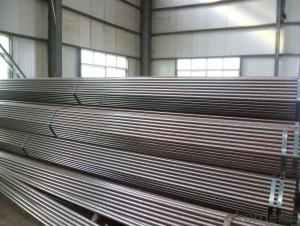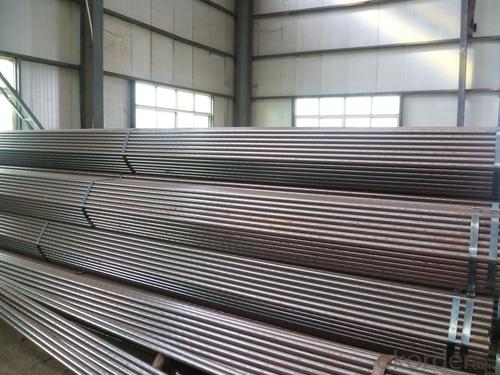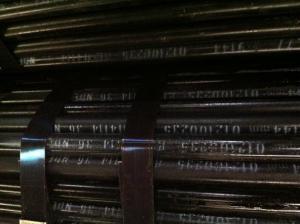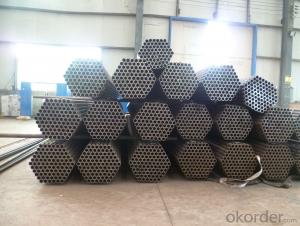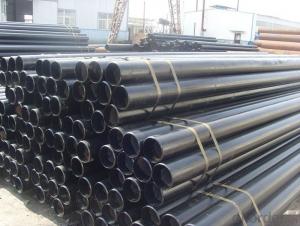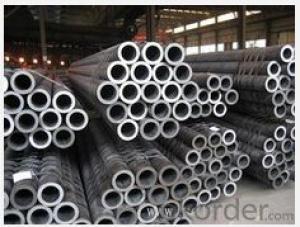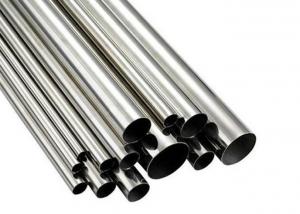Round Seamless Steel Tubes
- Loading Port:
- Tianjin
- Payment Terms:
- TT or LC
- Min Order Qty:
- 25-35 m.t.
- Supply Capability:
- 3000吨 m.t./month
OKorder Service Pledge
OKorder Financial Service
You Might Also Like
Product Description
1. Commodity Name: Carbon Seamless steel pipe
2. Standard: API,GB,ASTM,ASME,DIN
3. Quality grade: 10#, 20#, A106B, A53B, API 5L B, Q235, Q345, ST37-2, ST 45, ST52.etc.
4. Dimension:
OD: 1/2"-24"
WT: 2.5-80mm, SCH10~SCH40~XXL
Length: 5.8m,6m,8m,9m,12m
5. Technique: Hot Rolled/Cold Rolled/ Cold Drawn
6. Application:
Carbon seamless steel pipes are widely used in gas, water and oil, transpotation;constructions;Bridge,highway,windows of model steel door; building materials;fences;heating facilities Fluid Pipe;conduit pipe,scaffolding pipe.etc.
7. Payment Terms: L/C D/A D/P T/T
8.packing and shipment
Packaged in bundles,as per customers' requirements, it can also bepackagesd as beveled ends, typed marking, black painting, plastic caps protection,woven bags packing
For 20" container the max length is 5.8m; For 40" container the max length is 12m. other options are available based on customer requests. Please discuss when placing orders.
Packaging & Delivery
Packaging Details: | seaworthy package,bundles wrapped with strong steel strip |
Delivery Detail: | 15-30days after received 30%TT |
Seamless Steel Tubes Image
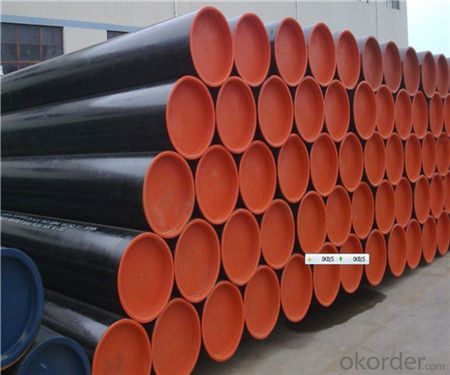
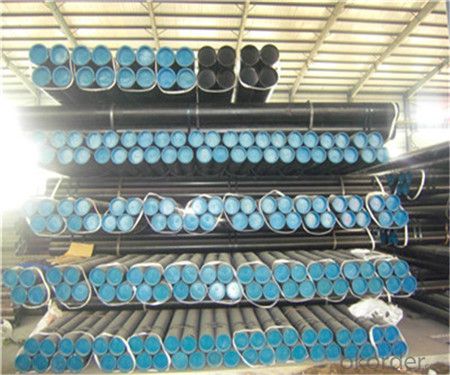
FAQ of Seamless Tube
①How is the quality of your products?
Our products are manufactured strictly according to national and internaional standard, and we take a test
on every pipe before delivered out. If you want see our quality certifications and all kinds of testing report, please just ask us for it.
Guaranteed: If products’ quality don’t accord to discription as we give or the promise before you place order, we promise 100% refund.
②How about price?
Yes, we are factory and be able to give you lowest price below market one, and we have a policy that “ for saving time and absolutely honest business attitude, we quote as lowest as possible for any customer, and discount can be given according to quantity”,if you like bargain and factory price is not low enough as you think, just don’t waste your time.Please trust the quotation we would give you, it is professional one.
③Why should you chose us?
Chose happens because of quality, then price, We can give you both.Additionally, we can also offer professional products inquiry, products knowledge train(for agents), smooth goods delivery, exellent customer solution proposals.Our service formula: good quality+good price+good service=customer’s trust
SGS test is available, customer inspection before shipping is welcome, third party inspection is no problem.
Any question, pls feel free to contact us !
- Q: How do steel pipes handle ground settlement?
- Steel pipes are generally robust and durable, making them well-suited for handling ground settlement. The flexibility and strength of steel allow the pipes to withstand the shifting and settling of the ground without significant damage. Steel pipes have a high resistance to deformation, which means they can maintain their shape and structural integrity even when the ground settles or moves. When the ground settles, steel pipes can accommodate the movement by flexing and bending slightly. This flexibility allows them to adjust to changes in the ground without breaking or cracking. Additionally, steel pipes are often designed with joints that can absorb and distribute stress caused by ground settlement. Furthermore, steel pipes have a smooth interior surface that minimizes friction and resistance to the flow of materials. This feature is particularly important when the ground settles because it reduces the likelihood of clogs or blockages due to debris or sediment settling in the pipes. In summary, steel pipes are well-equipped to handle ground settlement due to their strength, flexibility, and resistance to deformation. They can adapt to the movement of the ground without compromising their structural integrity, making them a reliable choice for various applications, including underground infrastructure and pipeline systems.
- Q: What is the difference between carbon steel and alloy steel pipes?
- Carbon steel and alloy steel pipes are both types of steel pipes, but they differ in their composition and properties. Carbon steel pipes are made primarily from carbon and iron, with small amounts of other elements such as manganese, silicon, and copper. They are known for their strength and durability, making them a popular choice for various applications in industries such as construction, oil and gas, and automotive. Carbon steel pipes are relatively inexpensive and have good resistance to corrosion. On the other hand, alloy steel pipes are made by adding other alloying elements to carbon steel. These alloying elements can include elements such as chromium, nickel, molybdenum, and vanadium, among others. The addition of these elements enhances the properties of the steel, such as increased strength, improved corrosion resistance, and better heat resistance. Alloy steel pipes are commonly used in high-temperature and high-pressure applications, such as in power plants, refineries, and chemical plants. In terms of cost, alloy steel pipes are generally more expensive than carbon steel pipes due to the additional alloying elements. However, the added benefits in performance and durability can often justify the higher cost. In summary, the main difference between carbon steel and alloy steel pipes lies in their composition and properties. Carbon steel pipes are primarily made of carbon and iron, while alloy steel pipes contain additional alloying elements for enhanced properties. Carbon steel pipes are known for their strength and affordability, while alloy steel pipes offer improved strength, corrosion resistance, and heat resistance.
- Q: How are steel pipes protected against chemical corrosion?
- Steel pipes are protected against chemical corrosion through various methods such as applying protective coatings like epoxy or polyethylene, using sacrificial anodes, cathodic protection systems, or employing corrosion inhibitors in the pipeline system.
- Q: How do you join two steel pipes together without welding?
- There are various ways to join two steel pipes together without welding. Mechanical fittings or connectors are commonly used for this purpose. These fittings are designed to securely connect pipes without the need for welding. Here are a few options you can explore: 1. Threaded Fittings: You can use threaded fittings, which have male and female threads that allow you to screw them together. To join the pipes, you will need to cut the ends of the pipes to create male and female threads. Apply thread sealant to ensure a tight and leak-free connection. 2. Compression Fittings: Another option is compression fittings, which consist of a nut, a compression ring, and a compression seat. These fittings create a tight seal by compressing the ring against the seat. Simply slide the compression ring and nut onto the pipe ends, and use a wrench to tighten the nut until a secure connection is formed. 3. Flange Connections: Flange connections involve using flanges, which are flat plates with bolt holes, to join the pipes. The flanges are bolted together using gaskets to create a tight seal. This method is commonly used for larger diameter pipes or in situations where frequent disassembly may be necessary. 4. Grooved Couplings: Grooved couplings are another option, particularly in plumbing and fire protection systems. They utilize a mechanical coupling housing with two grooved ends that fit over the pipe ends. The coupling is then secured using bolts or screws, which tighten the housing around the pipe ends, creating a secure connection. Before deciding on a method, it is crucial to consider the specific requirements of your application, such as the pipe diameter, pressure, and temperature. Additionally, ensure that the chosen method complies with relevant industry standards and regulations to ensure a safe and reliable connection.
- Q: Is hot dipped plastic pipe steel?
- The hot dipped plastic steel pipe is a steel pipe, and it is made of special antiseptic treated composite steel pipe.
- Q: 25 of the steel pipe with 6 in charge of what is the difference?
- Outer diameter representation of steel pipe:When the design is nominal diameter DN means diameter, should be nominal diameter DN and the corresponding product specifications table. Specification for unplasticized polyvinyl chloride pipes for building drainage, de (nominal outer diameter) * e (nominal wall thickness), (GB, 5836.1-92), polypropylene (PP) pipe for water supply, specifications by de * e (nominal outer diameter * wall thickness).
- Q: How do you transport and store steel pipes?
- Transporting and storing steel pipes requires careful planning and adherence to safety guidelines. Here are the steps involved in transporting and storing steel pipes: 1. Determine the appropriate mode of transportation: Depending on the quantity and weight of the steel pipes, you can choose between transportation by truck, train, or ship. Evaluate the distance, logistics, and cost-effectiveness of each option before making a decision. 2. Package and secure the steel pipes: Proper packaging is crucial to prevent damage during transit. Bundle the pipes together using steel strapping or banding. Ensure that the bundles are secured tightly to prevent any shifting or movement during transportation. 3. Use appropriate lifting equipment: When loading and unloading the pipes, use suitable lifting equipment such as cranes, forklifts, or hoists. Ensure that the equipment is capable of handling the weight and length of the pipes safely. 4. Protect against moisture and corrosion: Steel pipes are susceptible to moisture and corrosion, which can weaken their structural integrity. Before transportation, apply a protective coating or wrap the pipes with waterproof materials. Additionally, consider using moisture-absorbing desiccants or placing the pipes on pallets to elevate them off the ground. 5. Plan for safe storage: If storing the steel pipes for an extended period, choose a dry and secure location. Ensure that the storage area is well-ventilated and free from direct exposure to sunlight, rain, or extreme temperatures. Use racks or pallets to keep the pipes off the ground and prevent contact with moisture. 6. Inspect for damage: Before transportation and after storage, conduct thorough inspections to identify any damage or signs of corrosion. This will help you address any issues promptly and ensure the integrity of the steel pipes. Remember to comply with local regulations and safety guidelines specific to your region when transporting and storing steel pipes. By following these steps, you can ensure the safe and efficient transportation and storage of steel pipes, minimizing the risk of damage and maintaining their quality.
- Q: What are the different methods of joining steel pipes without welding?
- There are multiple ways to connect steel pipes without welding. These include: 1. Mechanical Couplings: These couplings consist of two separate pieces that attach to the pipe ends and then tighten together. They provide a secure and leak-proof connection, eliminating the need for welding. 2. Threaded Connections: This method involves threading the ends of the steel pipes to create a male and female connection. The pipes are then screwed together using pipe threads, creating a strong and dependable joint. 3. Flanged Connections: Flanges are utilized to connect steel pipes by bolting them together. The flanges have a flat surface with holes that align with corresponding holes in the opposing flange. Bolts are inserted and tightened to establish a tight seal. 4. Grooved Connections: This technique involves grooving the pipe ends and using grooved couplings to join them. The couplings have teeth that interlock with the grooves, resulting in a secure and rigid connection. 5. Compression Fittings: Compression fittings are employed to connect steel pipes by compressing a metal or plastic ring onto the outer surface of the pipe. This creates a tight seal and a reliable connection without welding. 6. Adhesive Bonding: Special adhesives designed for bonding metals can be used to connect steel pipes. The adhesive is applied to the pipe surfaces, which are then pressed together and left to cure, forming a strong and durable bond. 7. Clamping: Clamps can be used to hold steel pipes together, creating a temporary connection. This method is commonly used for testing purposes or in situations where the pipes need to be easily dismantled. Each of these methods has its own benefits and limitations, and the choice depends on various factors such as the specific application, pipe material, and required joint strength.
- Q: Can steel pipes be used for chemical storage tanks?
- No, steel pipes are not suitable for chemical storage tanks as they are not designed to handle the corrosive nature of many chemicals.
- Q: What are the different types of steel pipes available in the market?
- In the market, one can find a variety of steel pipes, each designed for specific purposes and applications. Some of the commonly used types are as follows: 1. Carbon Steel Pipes: These pipes are widely utilized due to their strength and durability. They are primarily employed in industries like oil and gas, construction, and plumbing for fluid and gas transportation. 2. Alloy Steel Pipes: By combining carbon steel with different metals like chromium, nickel, or molybdenum, alloy steel pipes offer enhanced strength, corrosion resistance, and heat resistance. They find applications in high-pressure environments such as power plants and chemical plants. 3. Stainless Steel Pipes: Highly resistant to corrosion and oxidation, stainless steel pipes are suitable for applications requiring hygiene and durability. Industries like food processing, pharmaceuticals, and water treatment commonly use them. 4. Galvanized Steel Pipes: These pipes are coated with a layer of zinc to protect against rust and corrosion. They are commonly found in plumbing systems and structures like fences and handrails. 5. Seamless Steel Pipes: These pipes are manufactured without any welding or joints, resulting in a smooth and continuous surface. They are known for their high strength and are often used in high-pressure applications. 6. Welded Steel Pipes: Made by rolling or bending a flat steel plate into a cylindrical shape and welding the edges together, welded pipes find common usage in construction, oil and gas, and automotive industries. 7. ERW (Electric Resistance Welded) Steel Pipes: ERW pipes are produced by passing a high-frequency electrical current through a steel strip, causing it to heat and form a weld. They are widely utilized in plumbing, water wells, and structural support. 8. LSAW (Longitudinal Submerged Arc Welded) Steel Pipes: LSAW pipes are created by bending and welding steel plates into a cylindrical shape. They are commonly employed for long-distance transportation of large volumes of oil, gas, or water. These examples represent only a fraction of the diverse range of steel pipes available in the market. The choice of the appropriate pipe type depends on factors such as the intended application, environmental conditions, and budget constraints. Consulting with experts or professionals is crucial in determining the most suitable steel pipe for a specific project or application.
Send your message to us
Round Seamless Steel Tubes
- Loading Port:
- Tianjin
- Payment Terms:
- TT or LC
- Min Order Qty:
- 25-35 m.t.
- Supply Capability:
- 3000吨 m.t./month
OKorder Service Pledge
OKorder Financial Service
Similar products
Hot products
Hot Searches
Related keywords
